
The article focuses on best practices for effective training in inside sales, emphasizing the importance of clear objectives, skill development, and the use of advanced training techniques. It supports this by detailing various strategies such as discovery workshops, role-playing, gamification, and the integration of technology, all aimed at enhancing sales representatives' abilities and fostering a customer-centric culture that ultimately drives success.
In the competitive realm of inside sales, effective training is paramount for success. Organizations face the challenge of equipping their sales teams with the necessary skills to navigate complex customer interactions and drive results. This article delves into the fundamentals of inside sales training, exploring essential techniques and technologies that can enhance learning outcomes.
From establishing clear objectives to leveraging advanced methodologies like role-playing and gamification, the focus is on creating a robust training framework that fosters continuous improvement. Additionally, the importance of building a customer-centric culture through tailored training programs is emphasized, highlighting how organizations can adapt to the evolving needs of their workforce.
By prioritizing these strategies, businesses can not only improve sales performance but also attract and retain top talent in a dynamic market.
Effective training for inside sales is based on understanding the distinct challenges associated with the role. Essential fundamentals include:
Discovery workshops play a pivotal role in identifying the kryptonite within teams, uncovering obstacles in business motions and value articulation that can hinder performance.
These workshops provide focused evaluations and practical insights, allowing organizations to customize their development efforts to match particular revenue objectives, ultimately resulting in enhanced outcomes. For instance, organizations focusing on enhancing consultative selling techniques can significantly improve their ability to establish credibility and meet client needs, leading to a notable increase in conversion rates. The consultative selling module, priced at $169.00, teaches the art of selling the problem first, followed by the solution, reinforcing the importance of effective problem-solution dynamics.
Incorporating regular feedback and performance evaluations is crucial for refining development efforts continuously. This method is emphasized by the ATD report, highlighting that U.S. companies invest approximately $20 billion each year in sales education, stressing the significance of effective program design. Moreover, considering that almost 70% of professionals describe themselves as 'self-taught social sellers'—without formal education—there is a significant opportunity for companies to offer organized selling education services that promote success.
As the commercial cycle becomes increasingly complex, fostering collaboration between business and marketing teams will prove essential in nurturing leads effectively. Lastly, identifying the four types of sales education plays a vital role in cultivating a well-rounded sales team, ensuring that all facets of the sales process are effectively addressed:
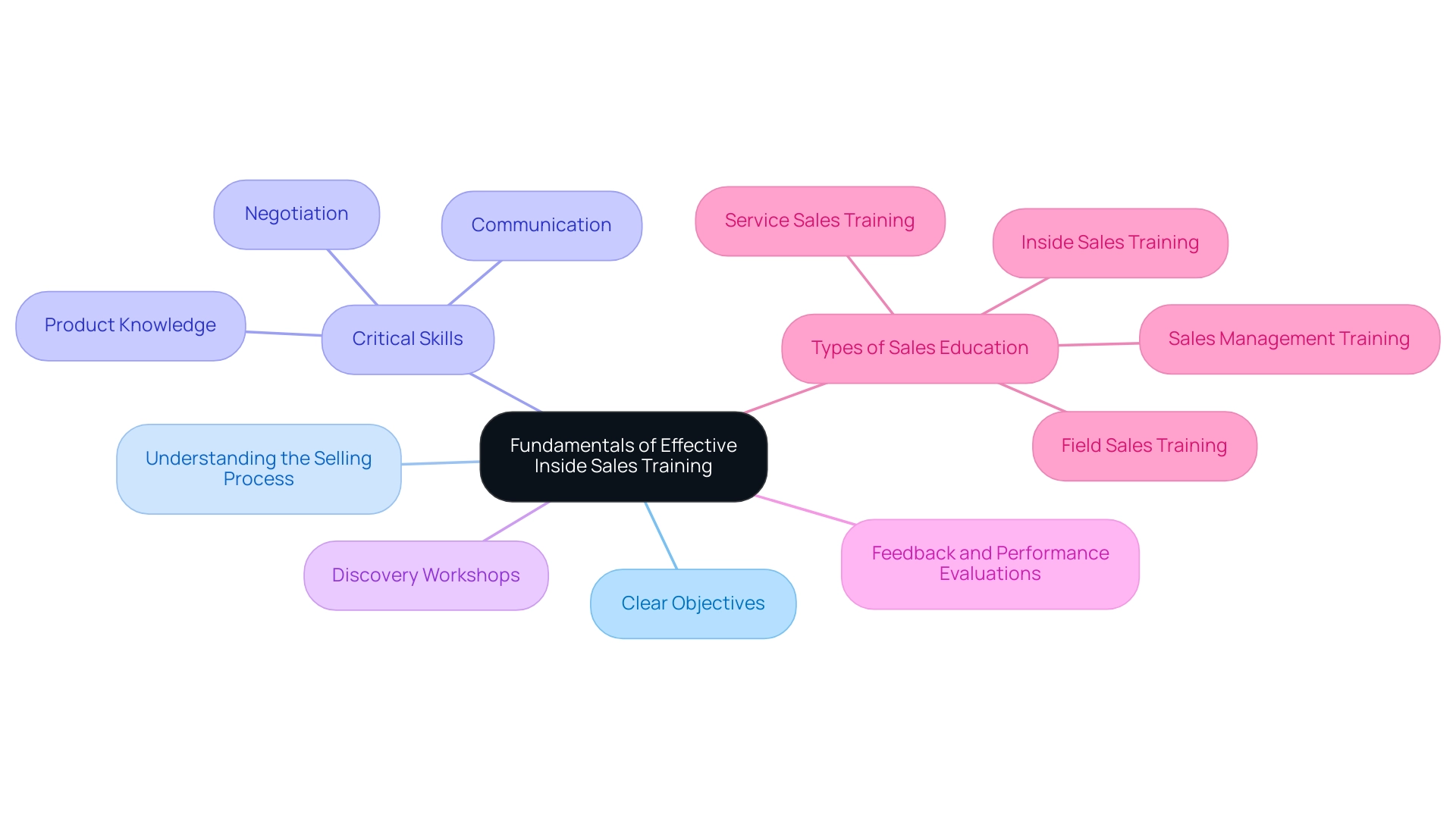
Advanced methods in training for inside sales, such as role-playing scenarios, gamification, and simulation-based learning, are crucial for enhancing skill development among representatives, particularly in the context of customized solutions for startups and enterprises.
Furthermore, gamification introduces competitive elements and rewards that engage teams more deeply with the content, increasing motivation and participation rates.
The importance of adopting such advanced instructional techniques is emphasized by the fact that only 17% of companies currently report having effective development systems. Significantly, a recent study uncovered that 62% of college graduates prioritize opportunities providing extensive education, emphasizing the essential role quality instruction plays in recruitment.
Furthermore, the transition from obsolete uniform methods to personalized solutions is essential, as high-growth firms are twice as likely to offer tailored development, leading to increased engagement, improved skill retention, and more effective application of learning.
For example, Pods Asia’s case studies demonstrate that companies adopting customized development programs experienced a 30% rise in performance within six months. With more than 20 years of experience and over 500 successful projects, Pods Asia’s proven sales transformation strategies can offer the insights necessary for effective commercialization in deep tech startups, particularly through the integration of robust Enterprise Network Security features that enhance the overall effectiveness of revenue preparation.
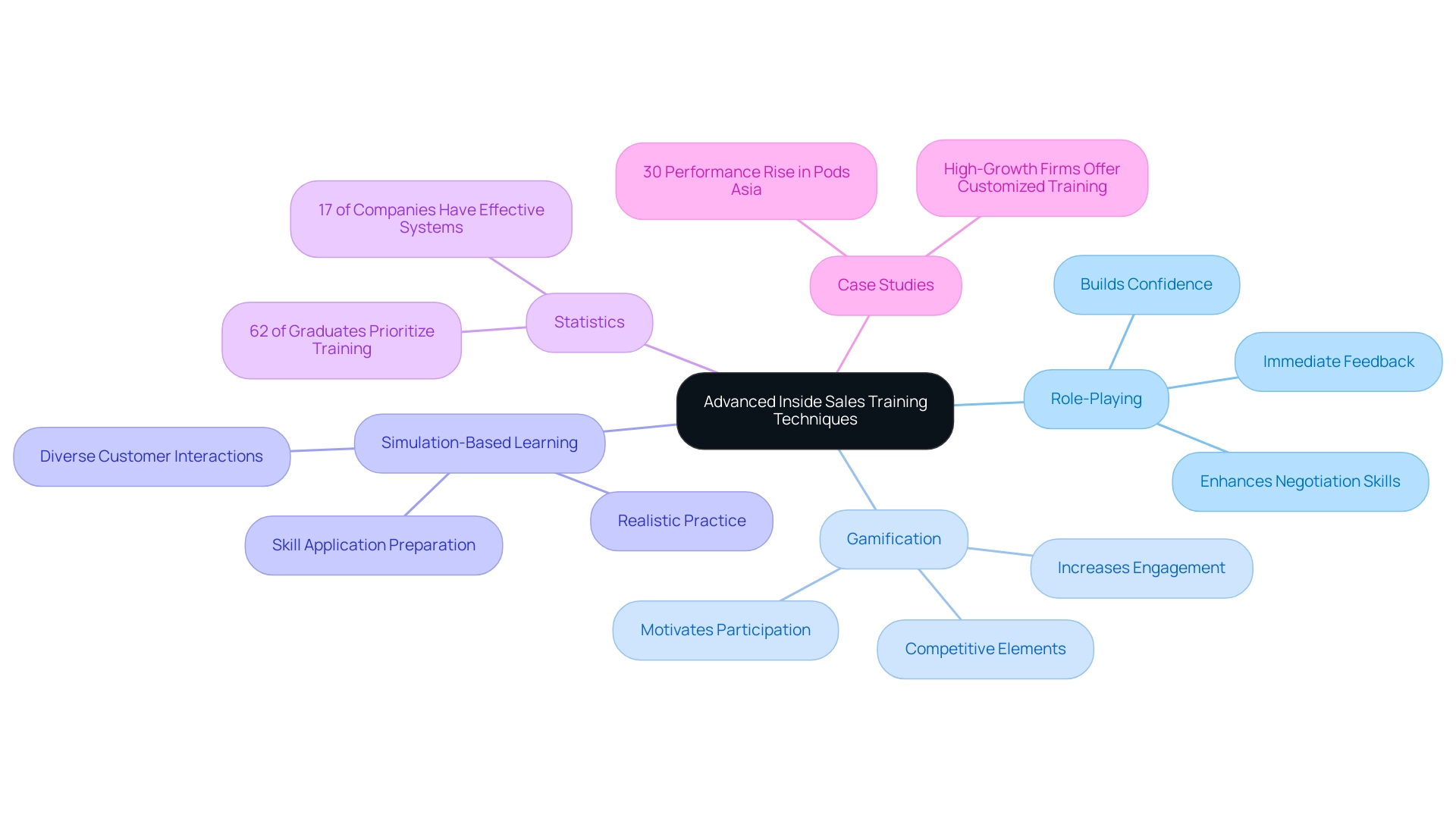
To enhance internal sales instruction, organizations must strategically incorporate a range of technological resources, specifically Learning Management Systems (LMS), Customer Relationship Management (CRM) software, and virtual education platforms. The Sales Bond Academy demonstrates how creative development systems can enable sales groups, offering them customized transformation-as-a-service that propels success. An LMS serves as a vital resource, capable of tracking learner progress, delivering educational materials, and facilitating interactive learning modules tailored to the needs of sales teams.
According to recent data, 77% of higher education faculty affirm the significance of LMS in educational settings, highlighting its value in professional development environments as well. In 2018, companies in the Netherlands requested development programs for managers, highlighting the growing recognition of the need for structured educational initiatives. At the same time, CRM systems improve performance management by offering insights into customer interactions and performance analytics, resulting in a customized and efficient learning experience.
For instance, CRM software can streamline communication and monitor customer engagement, allowing teams to refine their strategies based on real-time data. Moreover, a case study shows that 62% of college graduates prioritize opportunities that provide extensive education, illustrating that investing in strong skill development programs can attract top talent who value professional growth. Virtual learning platforms enhance accessibility by providing remote education opportunities, fostering flexibility and the ability to tap into a broader array of resources.
Additionally, potential clients can find answers to common inquiries in our FAQs, which cover aspects such as pricing and service offerings, ensuring transparency and informed decision-making. By utilizing these advanced technologies, organizations can foster a more dynamic and effective educational environment that not only improves learning results but also aligns with the evolving needs of the workforce. As Noah Young aptly states, 'Contrary to popular belief, this profession is not necessarily cutthroat.'
'Indeed, the employment role today centers around cooperation and inclusiveness,' emphasizing the necessity for a nurturing development structure that promotes teamwork and collective achievement.
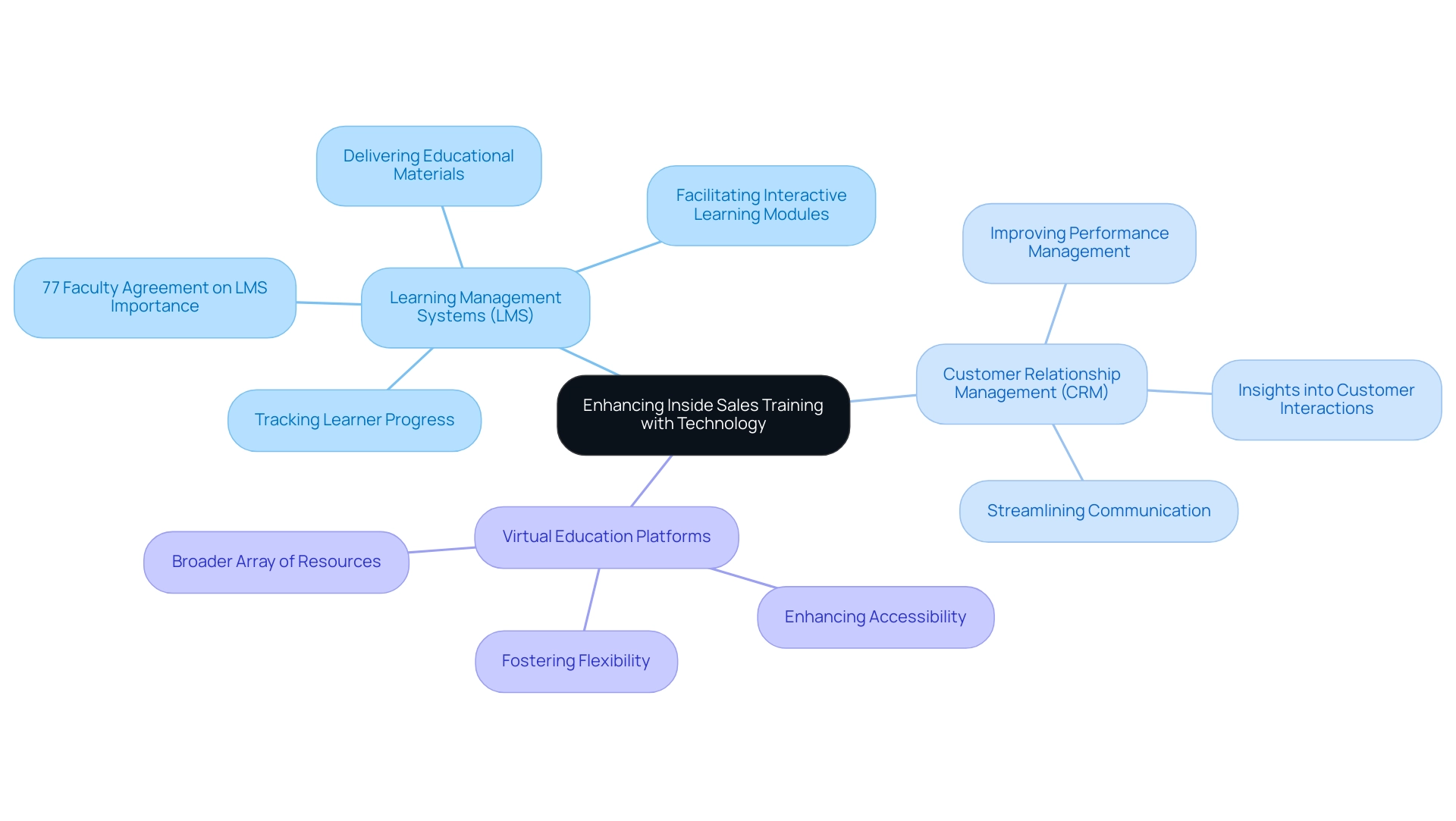
In the ever-evolving landscape of internal commerce, the necessity of continuous learning cannot be overstated. Organizations must prioritize regular development sessions, workshops, and refresher courses as training for inside sales to keep sales groups aligned with the latest industry trends, methodologies, and tools. According to recent findings, Allego's structured educational method has resulted in a remarkable 45% increase in win rates, illustrating the direct impact of robust instruction on revenue effectiveness.
Additionally, 62% of university graduates emphasize chances that provide thorough education, highlighting the significance of high-quality development initiatives in drawing exceptional talent. The high turnover rate among professionals—where nearly half of account executives cite poor training or onboarding as reasons for their departure—highlights the significant costs associated with inadequate learning initiatives, reinforcing the necessity for robust training programs, particularly training for inside sales. Furthermore, mastering product knowledge is crucial for representatives to optimize the customer journey and effectively match leads with the appropriate products.
To further enhance group capabilities, encouraging participation in webinars and industry conferences can promote vital knowledge sharing and valuable networking opportunities. By fostering a robust culture of ongoing education, organizations not only prepare their workforce to be more competitive and adaptable but also greatly enhance overall performance and customer satisfaction. Our educational program is priced at $150 per month, offering access to deep dive audio podcast sessions, tailored topics, and three consultation sessions per month.
Feedback from pleased clients emphasizes the impact of our method:
'The coaching has changed our sales tactics and greatly enhanced our group's performance.'
By investing in our extensive development solutions, organizations can ensure their sales personnel receive the necessary training for inside sales to equip them with the skills for success.
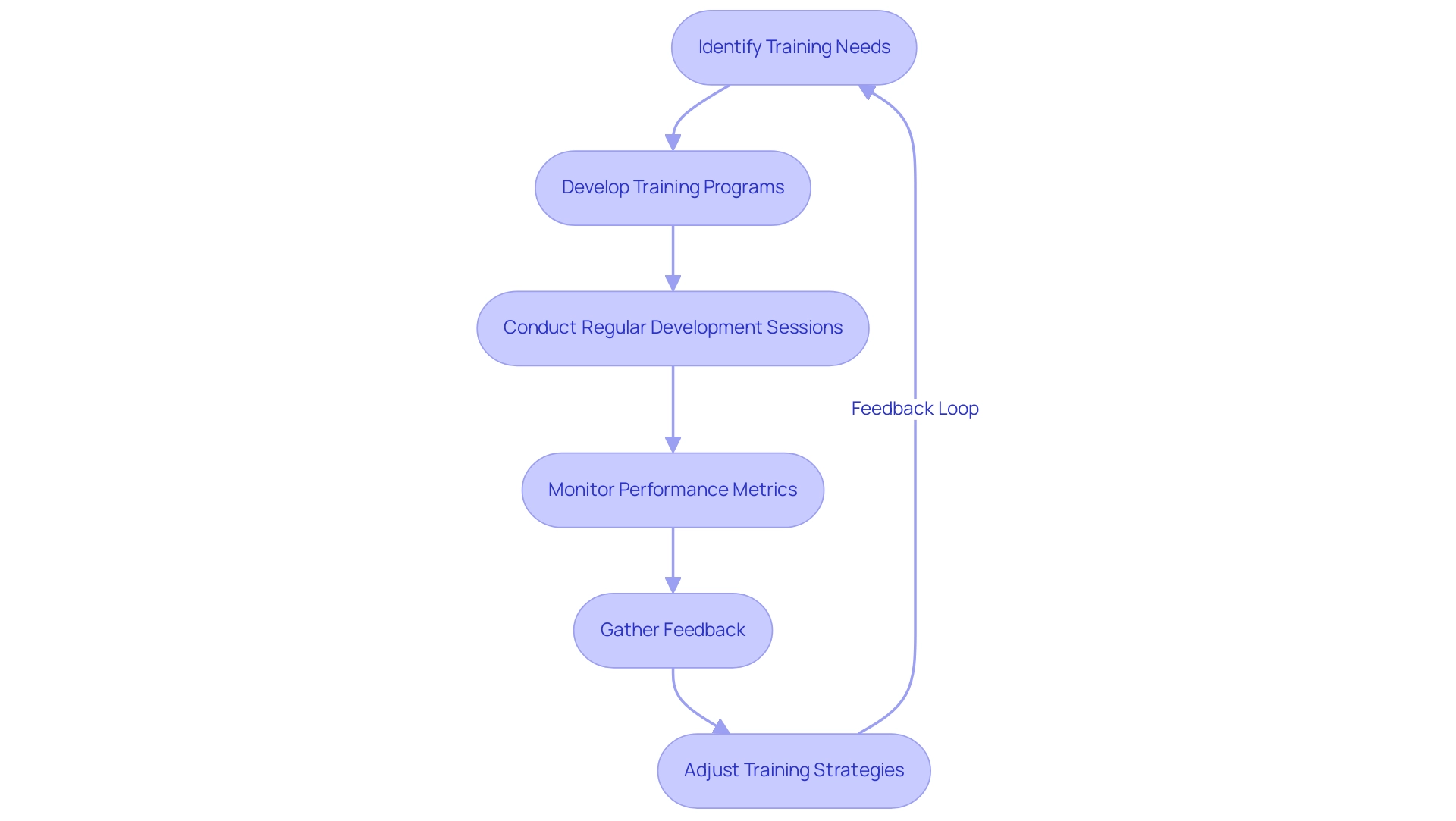
Creating a customer-focused environment within inside sales groups requires training for inside sales that highlights comprehending customer requirements while providing outstanding value. Sales representatives must be equipped with skills to actively listen, pose insightful questions, and customize their solutions to address the unique challenges faced by clients. The effectiveness of this approach is underscored by the fact that 57% of high-performing organizations recognize the importance of personalized content and learning paths.
To further improve your team's abilities, explore our downloadable business development packages that offer customized strategies for success. Incorporating customer feedback loops within the development process allows representatives to learn from actual customer interactions, fostering a cycle of continuous improvement. Moreover, utilizing novel commercial strategies like CRM and coaching tools can greatly improve these development efforts by enhancing data management and offering real-time feedback, thus fostering a customer-focused approach.
The shift from a one-size-fits-all model to tailored training initiatives, such as training for inside sales, has proven effective; high-growth companies are twice as likely to implement such customized training, leading to higher engagement and better skill retention. As noted by industry leaders, prioritizing employee satisfaction and a healthy career path is vital for fostering a productive environment. By focusing on the customer experience, organizations not only drive loyalty but also enhance sales effectiveness, paving the way for sustained long-term success.
Importantly, customer education programs can start small, allowing organizations to gradually implement these transformative strategies even with limited resources. For a more structured engagement, consider our fixed fee advisory packages that ensure a clear scope and measurable outcomes.
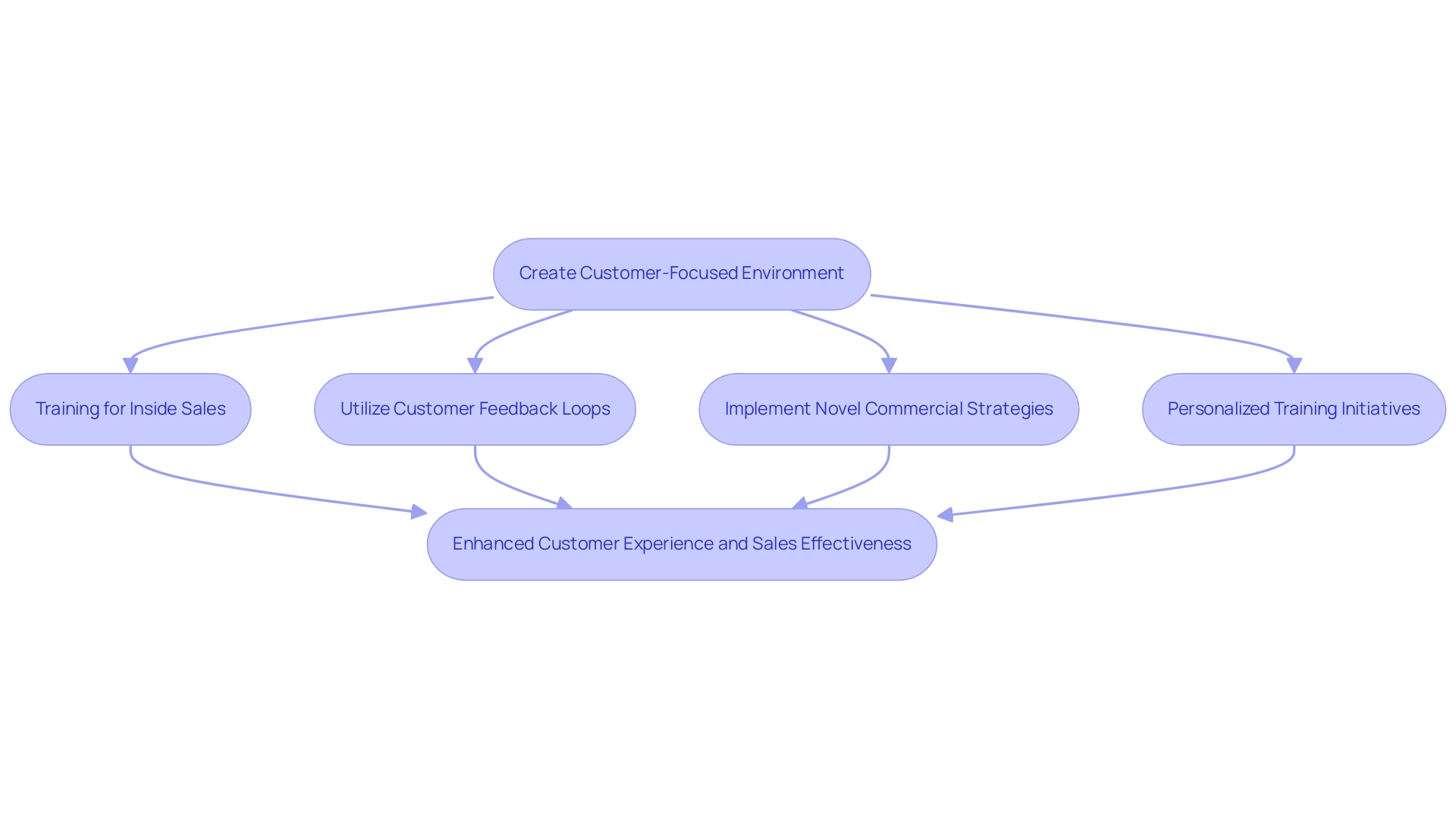
Implementing effective inside sales training is crucial for organizations aiming to thrive in a competitive market. By establishing clear objectives and understanding the unique challenges of sales roles, companies can create tailored training programs that address specific needs. Utilizing discovery workshops allows organizations to identify obstacles and refine their training efforts, enhancing skills such as communication and negotiation that are vital for success.
Advanced techniques like role-playing, gamification, and simulation-based learning further enrich the training experience, promoting engagement and skill retention. The integration of technology, including Learning Management Systems and CRM tools, not only streamlines training processes but also provides valuable insights into sales performance. As organizations embrace these innovations, they can foster a more dynamic and effective learning environment.
Continuous learning should be a priority, as it equips sales teams with the latest industry knowledge and methodologies. By encouraging ongoing education and participation in workshops, companies can enhance their sales effectiveness and reduce turnover rates. Building a customer-centric culture through tailored training ensures that sales representatives are prepared to meet client needs, driving loyalty and long-term success.
In summary, prioritizing effective inside sales training through targeted strategies, advanced methodologies, and a commitment to continuous improvement will not only enhance sales performance but also attract and retain top talent. This comprehensive approach positions organizations to adapt to the evolving landscape of inside sales and achieve sustained growth.
What are the essential fundamentals of effective training for inside sales?
Effective training for inside sales includes the establishment of clear objectives, a comprehensive understanding of the selling process, and the cultivation of critical skills such as communication, negotiation, and product knowledge.
What role do discovery workshops play in inside sales training?
Discovery workshops help identify obstacles within teams that can hinder performance. They provide focused evaluations and insights, allowing organizations to customize their development efforts to meet specific revenue objectives, ultimately enhancing outcomes.
How can consultative selling techniques impact sales performance?
Organizations that enhance their consultative selling techniques can improve their ability to establish credibility and meet client needs, leading to a notable increase in conversion rates.
What is included in the consultative selling module, and what is its cost?
The consultative selling module teaches the art of selling the problem first, followed by the solution, and it is priced at $169.00.
Why is regular feedback and performance evaluation important in sales training?
Regular feedback and performance evaluations are crucial for continuously refining development efforts, which is supported by the fact that U.S. companies invest approximately $20 billion annually in sales education.
What percentage of professionals consider themselves 'self-taught social sellers'?
Almost 70% of professionals describe themselves as 'self-taught social sellers,' indicating a significant opportunity for companies to provide organized selling education services.
What are the four types of sales education identified in the article?
The four types of sales education are: 1. Training for inside sales 2. Field sales education 3. Service sales education 4. Sales management education.
What advanced training methods are recommended for inside sales?
Advanced training methods include role-playing scenarios, gamification, and simulation-based learning, which enhance skill development among representatives.
How does role-playing benefit inside sales training?
Role-playing creates a controlled environment for practicing and refining negotiation skills, allowing for immediate feedback from peers and trainers, which enhances retention and builds confidence.
What advantages does gamification offer in sales training?
Gamification introduces competitive elements and rewards, increasing engagement, motivation, and participation rates among sales teams.
What is the significance of simulation-based exercises in training?
Simulation-based exercises mimic real-life sales scenarios, enabling representatives to practice responses to various customer interactions realistically, thereby improving engagement and skill application.
What is the current state of development systems in companies?
Only 17% of companies report having effective development systems, highlighting the need for improved training methods.
How does personalized training impact employee engagement and skill retention?
High-growth firms that offer tailored development programs experience increased engagement, improved skill retention, and more effective application of learning.
What results did Pods Asia achieve with customized development programs?
Companies adopting customized development programs experienced a 30% rise in performance within six months, demonstrating the effectiveness of personalized training strategies.